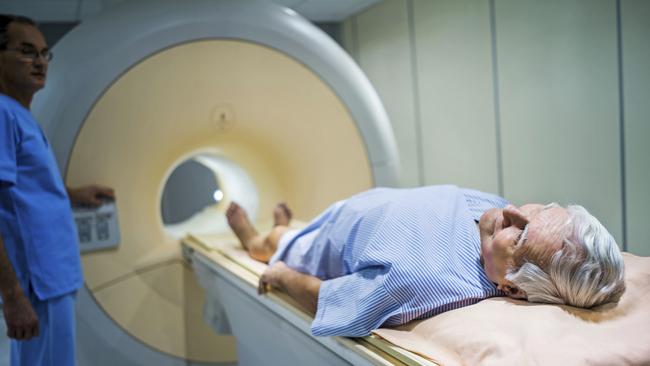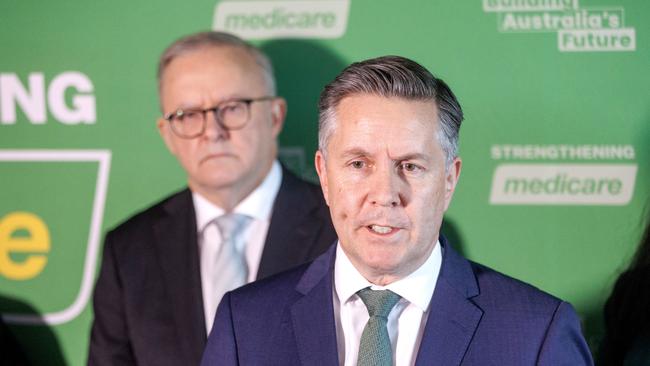Australia’s cheap prostate cancer treatment set to disappear
The Albanese government has dropped the ball with Australia’s brilliant low cost prostate cancer treatment set to disappear, even though it’s set to be part of our medical benefits scheme in July.

Swiss drugmaker Novartis predicted that the Australian government would not defend its nuclear medicine world technology leadership position. Under pressure, it would roll over.
And they were correct. Australia’s brilliant low cost prostate cancer treatment – the so-called “Lutetium PSMA I&t” – will no longer be available to Australians, despite being set to be part of our medical benefits scheme in July.
Lucky residents of Singapore, Belgium and many other countries, including Switzerland, will still be able to take advantage of Australian technology.
Australian prostate cancer suffers will now have to pay the current Novartis price of $34,000 a dose (up to six are required) for Swiss technology compared to $8000 a dose for the “Lutetium PSMA I&t” technology but reduced to a token amount after July 1.The Swiss punted that the Australian government is on a spending spree so will happily replace spending $48,000 for six doses of “Lutetium PSMA I&t” compared with the current price of $200,000 for six doses of the Swiss product.

Canberra seems to mix up nuclear medicine and nuclear energy and will not fight for the validity of its Australian technology despite its brilliant performance.
Accordingly, the Swiss look to have made an accurate assessment.
Health minister Mark Butler is looking for votes by putting more medicines on the PBS, and Industry Minister Ed Husic advocates developing Australian technology. Both were outsmarted by the brilliant Swiss tactics. But in fairness to Butler and Husic the opposition also couldn’t be bothered defending Australia’s leading position on world nuclear medicine.
I suspect neither the government nor the opposition realised that their failure to act will cause Australian deaths.

Meanwhile, over in the US, American drugmakers are attacking the Australian medical benefits scheme.
While the issues are different, the fact that we rolled over in such an important area will give the Americans great confidence that under pressure the Australian government in health matters “goes to water”.
Readers will remember that I put out an alert last month that unless the government took action, Australian prostate cancer suffers would not be able to receive “Lutetium PSMA I&t” either now or when it goes on the medical benefits on July 1.
We should not be critical of Novartis. By correctly assessing the mood of the federal government and its priorities. They spent large sums on legal firepower. Novartis began sending letters to our hospitals that their legal advisors declared as a warning and most of those receiving the letters have withdrawn the life saving “Lutetium PSMA I&t” technology.

These organisations simply didn’t have the money to fight or pay damages should they lose.
The actual Swiss Federal Court action is against GenesisCare, which is owned by private capital firm Oaktree. They could not afford a legal fight against a multi-billion dollar company like Novartis. GenesisCare has stopped providing the Australian product and is negotiating a settlement. Most others will follow as will prostate cancer deaths.
“Lutetium PSMA I&t” is delivered by injection and uses radioactive isotopes to attack cancer cells These radioactive molecules find cancer cells and attack them with radiation. Usually it is a last resort treatment after chemotherapy and other treatments have failed.
The development of “Lutetium PSMA I&t” started in a German university in 2015 and in 2016 at the Peter MacCallum Cancer Centre in Melbourne.
The Germans and Australians, including St Vincent’s Hospital research in Sydney, have worked closely on its development. During the decade of German-Australian development, another German group developed a treatment and, like the first group, went to Australia to access our world-class expertise to help. But this time patents were taken out.
The Australian and German developers of “Lutetium PSMA I&t” always strongly believed the technology was not eligible to be patented. But the second German group took out and sold their technology to Novartis.
The rare earth Lutetium is normally obtained by ANSTO from the Russian/Ukraine deposits.
Last December the government put Australia’s “Lutetium PSMA I&t” on the subsidised list for medicines, starting July 1. But of course with hospitals now too frightened to administer the “Lutetium PSMA I&t” the government action is useless. At the core of the Novartis case is the fact that the Swiss producer has patents which override the “Lutetium PSMA I&t” technology.
The Australians have always believed the Swiss were wrong and saw the Swiss as “copycats” but Novartis say it’s the Australians who are “copycats” and are claiming “Lutetium PSMA I&t” breaches their patents.
The government had three choices. First it could guarantee GenesisCare and the hospitals against court actions and provide their legal aid to fight the matter in court. Second industry minister Husic could pass an act declaring the Novartis patents inapplicable in Australia. Thirdly it could roll over and do nothing despite the human consequences and the likelihood of an enormous bill by using the Swiss technology.
As the Swiss predicted, Butler and Husic chose the “do nothing” option.
The pressure starts when people start dying. Butler and Husic are hoping it doesn’t happen in the middle of the election campaign.




To join the conversation, please log in. Don't have an account? Register
Join the conversation, you are commenting as Logout